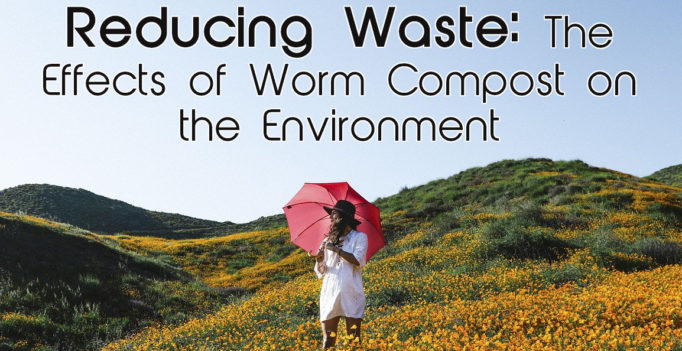How well do you think humans live and care for our earth? Is the condition of our planet good enough for you, for your children and grandchildren?
Like it or not, what we do today determines our tomorrow. In fact, all we do affects the world around us. Be it small or great, each of our actions results in a positive, negative, or neutral impact. And as we have seen over time, even the little stuff adds up.
That’s why with global warming on the rise and our own pollution to blame, effective, efficient, and rapid solutions aren’t just a nice idea; they are a must.
Today you will see how even small-scale worm composting is a step in the right direction. How one worm bin at a time we are able to shift a growing waste and pollution problem in a positive direction. You will learn why transforming food scraps and paper trash into fertilizer creates a better environment for us all.
What is worm composting?
Worm composting is the process of turning organic matter into compost using the mighty power of Eisenia fedita, red wiggler compost worms.
In vermi(worm)composting, we take what would otherwise be trash and repurpose it as food for red wigglers. These specialized worms consume, digest, and expel naturally nutrient-rich casts (worm poop). The accumulated mixture of their casts and decomposing bedding create the ultimate soil amendment and fertilizer.
The value of these worms as a resource is appreciated around the world. It’s no surprise that what these little guys give has earned the nickname “black gold”! But are we making the most of it?
Reduce, Reuse, Recycle
Consumer culture has brought us a world of disposable razors, disposable diapers, disposable cameras, and so much more. Where our ancestors would say, Waste not, want not, we too often say, Just throw it away and get a new one.
We see that the same thinking applies to our abuse of food. According to the Food and Agricultural Organization of the United States, nearly a third of the overall food supply is thrown away each year! That’s 1.3 BILLION TONS of methane-spewing landfill. 1.3 billion tons of garbage that we do have a better use for.
Every meal prepared, and every haul of junk mail is an opportunity to reduce your contribution to this crisis. When you reuse a newspaper or the shell of an avocado, for example, you give new and greater value to what would otherwise be thrown away.
Would you believe we each toss an average of 1 pound of garbage per day!? It’s only when that goes into the worm bin instead of the trash can that things begin to turn around.
What’s wrong with waste?
Here in the U.S., it’s hard to keep a clear picture of the damage we actually do. Most of us have our garbage swiftly gobbled up and hauled away each week. Out of sight, out of mind. Right? When the worst of it is in someone else’s backyard it’s easy to understand why we’d imagine it to be not so bad.
Unfortunately, the truth is that our garbage pollutes nearly all of our most precious natural resources. Huge populations of plants, animals, and humans suffer ill health caused by the toxins we let into our water, air, and soil. And now, global warming threatens our very existence.
The burden of managing disposal, trash collection, and vast areas of landfill is no small feat. It takes land, fuel, time, and so many dollars to “take care” of our garbage. But the problem remains.
Earth and its people are paying for this mess in too many ways. Still, the problem continues to escalate. However, there is a solution, and it starts with you and me.
A Little Solution for Big Pollution
Every pound of worms starts out eating about 3.5 pounds of food and paper scraps per week. That in itself is rather impressive. But it doesn’t stop there.
Very quickly a small population doubles and begins to divert 7 pounds of trash per week. And as time and space allow, these numbers multiply and your waste reducing impact skyrockets.
But what actually happens once the worms eat the garbage? Something even better, if you can believe it!
A Green Machine
Though red wiggler compost worms are actually pink, they’ve got to be the “greenest” of all creatures. For every 5 pounds of trash they take out of our hands, they yield about 1 pound of nutrient-rich finished compost.
That compost added back to the earth starts to heal and enrich a most vital resource, our soil. Healthy soil supports the natural chain of life that we all benefit from. Soon, new life takes hold and what was once depleted becomes whole again.
As ecosystems are restored from the ground up, balance returns and creatures thrive. All that from just a hungry bunch of worms and some trash!
Are worms the only way?
There are many ways we can help the state of our planet. Worm composting is just the most effective and efficient way for us with limited resources and reach.
Other forms of composting are nice ways to supplement your worm composting means of waste management. Hot pile composting works for large amounts of yard waste, but it takes much longer than using worms. Bokashi composting requires the addition of a fermenting agent and time to ferment your materials. Unfortunately, the pickled remains are too acidic for immediate use and need weeks to become neutralized. Plus, it smells!
Worm compost is quickly finished and perfect from the start. It has both a neutral pH and is teeming with microbiotics that protect young plants from harm. It is conveniently made inside or out and has no offensive odor. Most importantly, worm composting just allows you to reduce more waste in a shorter amount of time.
Realistic Expectations
Getting your first worm herd started takes about 3 months. That means after about 3 months you should be able to harvest your first load of compost. Thereafter, with a now much larger herd, you should be able to harvest once each month.
On average, a single pound of red wigglers can help a family reduce 182 pounds of waste per person, per year. How many people are in your family? I have 5, so together we can expect to transform easily 1,000 pounds of waste this year alone.
With multiple worm bins full of mature red wigglers, I know not only will we not have to haul that much garbage away, but I’ll also have some 200 pounds of chemical-free compost to enrich my garden with. You can do the same!
Conclusion
Now you can see how quickly the extra effort of recycling or upcycling your household waste adds up. Indeed, the rewards are nearly immeasurable.
So, never let someone tell you that your part would never be enough. Each one of us makes a difference. It’s up to us what difference we make.
If you are ready to do your part for future generations, for yourself and others, you are in the right place. It only takes a small population of worms to get started. An easily maintained, all-in-one worm farm makes jumping in quick and simple.
Choose to do your part and look forward to a brighter future. Choose worm composting to create far less waste. Raise your own red wiggler composting worms and contribute to the solution, instead of the pollution!


This is really great …
Great article, informative, eye-opening, fun. (Scary too.) Just shared via Facebook. Hopefully, and we need a lot of hope and an enormous amount of work, more people will wise up. Our future depends on it. I raise, on a very small scale, worms, and all my good microbes are gone, almost all of my worms are gone (centipedes) and scraps don’t break down like they used to, soil doesn’t smell good anymore, terrible. I read an article a few minutes ago by a young lady attempting to make the connection between poor soil and contrails. I have to say, she’s making sense to me. anyway, thanks for the good article.
I am personally starting a composter and this is one of my causes for doing it. Thank you!